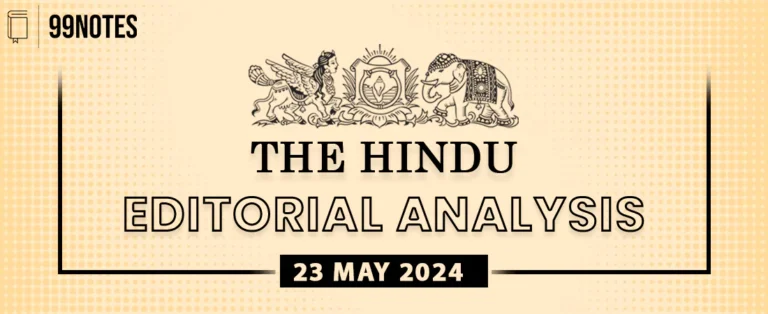4 May 2023 : The Hindu Editorial
Valour and prestige — the world of special operations.
Topic: GS2 – International Relations – Indian Diaspora, GS3 – Disaster management
Previous year Questions:
- No Question has yet been asked on rescue operation in the past in the Mains. But, a question is highly expected this year.
Context:
- The Sudan rescue mission, Operation Kaveri, exemplifies the importance of preserving the ethos and specialised training of the Indian Air Force’s special operations crews and why any attempt to dilute them would be unwise.
Issue:
- The recent Sudan rescue mission, Operation Kaveri, demonstrated the importance of preserving the specialised training and ethos of the Indian Air Force’s special operations crews.
- The IAF’s acquisition of the C-130J and C-17 Globemaster aircraft has significantly enhanced its special operations capability.
- The Kandahar incident of 1999 highlighted India’s need for specialised aircraft for risky missions.
- Since then, the IAF has successfully conducted high-risk missions in Afghanistan, including evacuating Indian Embassy personnel from Herat in April 2020 and a Kabul mission in August 2021 amid chaotic conditions.
- The success of these missions is attributed not just to the specialised aircraft but also to the selection and training of aircrew and commandos.
- Special operations are more than stick-and-throttle operations (simple operations which need no skill other than operating an aircraft); they carry the weight of a nation’s prestige and require a non-military intangible element.
- The IAF’s special operations crew must maintain their training and ethos using the versatile C-130s for routine tasks or VIP carriage.
Present imperfect.
Topic: GS1 – Indian society, GS2 – International relations.
Context:
- The S. Commission on International Religious Freedom (USCIRF) has called for India to be designated a “Country of Particular Concern” for its worsening record on religious freedoms.
- The USCIRF has designated India a “Country of Particular Concern” for the 4th consecutive year.
Issue:
- The report highlights India’s discriminatory policies towards minorities, including Muslims, Christians, Sikhs, Dalits, and Adivasis, and criticises the suppression of critical voices and NGOs.
- The USCIRF has called for sanctions on Indian government agencies and officials and criticised the U.S. State Department for not designating India as a CPC.
- The Indian government has rejected the report, calling it biased and motivated, and asked the USCIRF to “develop a better understanding of India.”
- The USCIRF’s recommendations hold no sway within India, but the government may consider an internal review of its conduct and direction on religious freedoms and rights.
- Ultimately, a government must deliver justice, equality, and security to its citizens rather than achieving a perfect score in a survey run abroad.
More About the U.S. Commission on International Religious Freedom (USCIRF):
- The USCIRF is an independent, bipartisan U.S. federal government commission created by the International Religious Freedom Act of 1998 (IRFA) to monitor the universal right to freedom of religion or belief abroad.
- The commission consists of nine appointed commissioners who are experts in religion, human rights, and foreign policy and are set by the U.S. President and Congressional leaders of both political parties.
- The USCIRF’s mandate is to review the facts and circumstances of violations of religious freedom internationally and to make policy recommendations to the President, Secretary of State, and Congress.
- The commission produces an annual report which identifies countries of particular concern (CPCs) for religious freedom violations and recommends actions that the U.S. government should take to promote religious freedom and protect religious minorities.
- Countries designated as CPCs can face diplomatic consequences, such as targeted sanctions or trade restrictions, but these actions are not automatic.
- Some have criticised the USCIRF for being biased towards the U.S. perspective and for not examining religious freedom issues within the U.S. itself.
A guaranteed pension is not lousy economics.
Topic: GS3 – Indian economy and government policies.
Context:
- A proposed solution to the debate on pensions in India is to implement a Contributory Guaranteed Pension Scheme (CGPS) in place of the current New Pension Scheme (NPS) or the old pension scheme (OPS).
Issue:
- Some state governments are reverting to the old pension scheme (OPS) despite economists arguing it is fiscally unsustainable and takes away from other welfare expenditures.
- The public sector workers are asking for a contributory guaranteed pension scheme (CGPS) in place of the new pension scheme (NPS), which fluctuates according to market returns.
- The proposed CGPS would have employees contribute 10% of their basic pay monthly, and the State promises to pay a pension of 50% of the last drawn salary, adjusted for inflation.
- The critical difference between the OPS and the CGPS is that the employees will fund a large part of the latter as against no contribution in the former.
- If the market return happens to be higher than the CGPS, the State gets to pocket that, and employers and employees share the burden of uncertainty.
- The proposed CGPS gives guaranteed pensions to the employees without putting the exchequer under additional burden, making it a win-win for all stakeholders.
What is Contributory Guaranteed Pension Scheme (CGPS)?
- Contributory Guaranteed Pension Scheme (CGPS) is a type of pension scheme where employees contribute a percentage of their salary towards their pension during their working life, and the employer provides a guaranteed pension after the employee retires.
- The pension amount is usually a percentage of the last drawn salary, adjusted for inflation.
- The critical difference between CGPS and other pension schemes is that a large part of the pension is funded by the employees themselves, as opposed to no contribution in traditional pension schemes.
- The State pays the additional balance of the difference between the guaranteed pension and the market-determined pension amount.
- This scheme is intended to provide a secure and reliable retirement income for employees while reducing the burden on the State.



